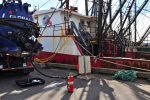Coalition Calls for Dockside Bilge Pumpout in New Bedford Harbor
A dockside bilge pumpout facility is desperately needed to prevent the discharge of oily bilge water from boats into New Bedford Harbor.

A pumpout truck removes bilge water from a fishing vessel on New Bedford Harbor. This bilge water – and any oil it contains – is recycled at a collection facility instead of ending up in the harbor.
As the City of New Bedford and the Town of Fairhaven have initiated the process for amendments to their 15-year-old Municipal Harbor Plan (MHP), the Buzzards Bay Coalition maintains that the requirement for a dockside bilge pumpout is a priority in this revision.
Between 2006 and 2022, there were 639 reported oil spills in New Bedford Harbor. The primary source of these spills comes from the discharge of oil contaminated bilge water. Between five to 20 gallons of diesel, hydraulic, and lube oils gather in the bilge of commercial fishing vessels. When the bilges pump out into the Harbor, varying amounts of petroleum products end up in the water with no way of knowing who polluted the water.
For more than a decade, the United States Coast Guard, Massachusetts Department of Environmental Protection (MassDEP), and other Harbor users have universally agreed on both the problem and the solution of so-called “Mystery Oil Spills”: A dockside pumpout facility—a critical piece of infrastructure that is commonplace in similarly demanding and diverse commercial harbors in the US—is needed to reduce bilge oil discharges into New Bedford Harbor.
In 2024, the Coalition received a grant from the Massachusetts Department of Environmental Protection to inventory all potential dockside locations and pumpout technologies to serve the Harbor’s industries and prevent future mystery oil spills. The Coalition will share this work with the planning team to ensure that the MHP incorporates the work completed to date and that the MHP supports efforts to construct, operate and maintain a pumpout facility in the Harbor.
The Coalition has been advocating for ways to tackle the oily bilge water problem. You can learn more about the Clean Bilge pilot program the Coalition started in 2016 here.